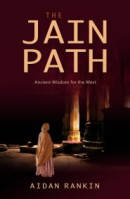 | Saturday January 27, 2007 |

The word Jainism conjures up images of ascetics who cover their mouths and sweep the ground before them with small brushes to avoid injuring the most minuscule forms of life. Some are also aware of the Jain-owned animal sanctuaries where even the sickest, most deformed birds and beasts are protected and cherished. These overt manifestations of an ancient faith challenge the comfortable - and near-universal - assumption of human precedence over other creatures. They dramatise for us the doctrine of ahimsa: non-violence or, more literally, the avoidance of anything that causes harm.
This ideal profoundly influenced Mahatma Gandhi, through his friendship with the Jain scholar Shrimad Rajchandra. Ahimsa was the basis of Gandhi's satyagraha (truth struggle) against colonial rule and caused him to rethink many aspects of contemporary Hindu practice. He committed himself, for instance, to the equality of women and the emancipation of the lowest castes, both ideas strongly in tune with Jain doctrine. Jainism prefers to exert such subtle influence, rather than seeking converts. Ahimsa extends to the intellectual arena, in ways we can learn from in our approach to inter-faith issues and the whole way we "do" politics.
In Jainism, the non-violence of the mind is called anekantvada. This means "many-sidedness" and is an inoculation against fundamentalist rigidity. Unlike postmodernism, however, many-sidedness does not deny the existence of objective truth. Instead, it regards truth as such a powerful force that it should be approached with humility and care. All humans - and non-humans - are on the same spiritual journey towards truth and it is likely to take us many lifetimes to grasp it. The more dogmatically certain someone is, the further they are likely to be from enlightenment.
Accordingly, truth can be approached from different angles, as the summit of a mountain may be reached by different paths, some straight, some winding. But knowledge grows with an understanding that many paths exist and that one's own is not necessarily the most correct. Our beliefs, political or spiritual, are mere facets of reality, not reality itself.
For the western consciousness, this approach is radical in the literal sense. It challenges at the root both our thinking and the way we organise our thoughts. In many-sidedness, there is no "battle of ideas", because this is considered to be a form of intellectual himsa or damage, leading quite logically to physical violence and war. The adversarial method gives rise to sterile "debate", entrenched positions and artificial polarities. Within Jainism, for example, the division between spirituality and science that still dogs so much of western thought simply does not exist. So "scientific" is Jain spirituality that Albert Einstein once expressed a wish to be reborn in India as a Jain.
In today's world, the limitations of the adversarial, either/or form of argument are increasingly apparent. Even the mounting ecological crisis is linked to adversarialism, because it arises from a false division between humanity and "the rest" of nature. "Either you're with us or against us" was President Bush's war cry (and look where it has got him), but it sums up the adversarial mindset and is by no means confined to the political or religious right. All too often, progressive movements use the same language of inflexibility and hate.
Many-sidedness is about conversation in place of debate, exploring the whole of an issue rather than breaking it down into convenient pairs of opposites. It compels us to ask "how can we?" instead of arrogantly asserting that "we should". This is a path for our time.